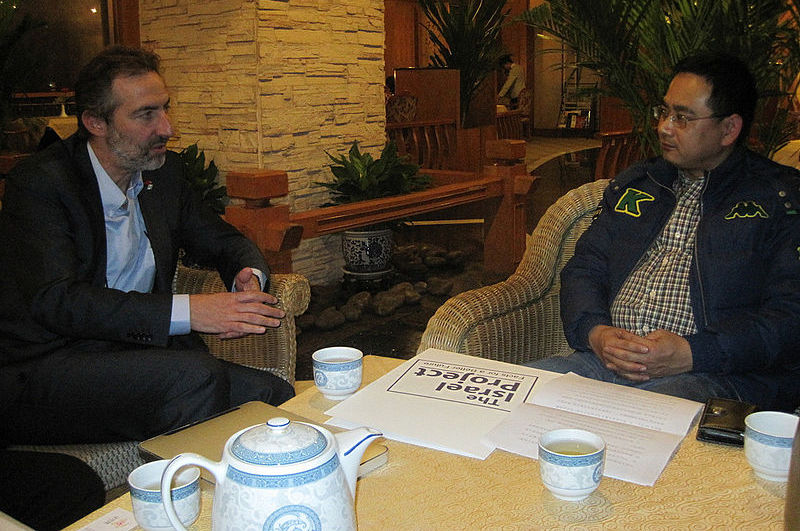
January 29, 2015, by Tony Hong
Fieldwork reflections: Elusive subjects and the value of trust
By Gareth Shaw,
PhD Candidate in Contemporary Chinese Studies,
The University of Nottingham, UK.
I’ve often heard from fellow scholars that conducting fieldwork in a foreign country represents one of the most challenging aspects of a research project. It can often seem like a battle fought between endless bureaucracy and one’s own faltering reserves of determination. Clearly, the challenges faced depend greatly on the topic that one is researching, but for those who are conducting studies into minority groups or subcultures—and I count myself among that group—perhaps a far greater challenge is that of establishing contact and building a relationship of trust with one’s subjects. My research project examines aspects of the literary representation of same-sex relationships within emerging online communities in Chinese cyberspace. To compliment my textual analysis of a broad selection of ‘micro-novels’, I intended to travel to China to conduct face-to-face interviews with both producers and consumers of this type of literary artefact, in order to explore and contest some of the emerging themes and discourses that my prior research has established. Given the prevalence of such material on social networking sites, surely finding people to talk to me would be easy, right? Wrong. Despite repeated online appeals for participants in various forums and on numerous communication platforms, to my horror I was drawing a complete blank. As the scheduled time for my fieldwork trip drew ever nearer, panic was setting in, and I subsequently delayed my departure for several months, believing that a breakthrough must be on the horizon. Eventually, I could wait no longer, and armed with only a handful of possible contacts in Beijing and a tentative agreement for one interview in Ningbo, I departed for China.
Mercifully for the fate of my research, I had completely forgotten one of the most often cited ways of accomplishing things in Chinese business culture… guanxi. In my determination to ‘go straight to the horse’s mouth’, as it were, I had neglected to attempt to tap into my own pre-existing networks of friends and acquaintances in China. I’d purposely neglected them—because I knew they had no interest in the topic that I’m researching—but, in conversations since my arrival back in China, it’s amazing how many of them seemed to have a friend (or a friend of a friend) who might be interested in what I’m doing. Nearly all of these leads proved fruitful, and in turn, once I’d interviewed that respondent and established a level of trust with them, they in turn had more contacts to introduce me to. This kind of snowball sampling has been my salvation in China. My online appeals in forums and chat rooms have gone unanswered because, when researching topics of a sensitive nature (and, notwithstanding improvements in recent years, homosexuality and open discussion of same-sex attraction continue to be sensitive topics in Chinese culture), it seems that people are supremely reluctant to open up to a total stranger, even from behind the relative anonymity of a keyboard. This was something I greatly underestimated.
During the initial stages of my fieldwork planning, I expressed doubts as to the value of physically travelling to China as part of my research, believing that—as I was analysing an internet-based form of expression that can be accessed from anywhere on the planet—people would me much more likely to talk to me online, so that they could retain their anonymity. I was mistaken in this regard, as my rebuffed attempts only too keenly proved. It is, in my experience, vital to establish links of trust through other people, to utilise one’s own social networks, and through these gatekeepers, a hidden treasure trove of information can sometimes be accessed. Before coming to China, I was hoping to find 10-15 people to interview. I’m currently on week two of my six-week trip, and so far I’ve conducted nearly 20 interviews, drawing out some wonderfully rich data for my thesis. Even though some of these interviews were subsequently conducted through the Internet, there needed to be some level of offline referral first. Obviously, this is something that one should consider in the research design, and reflection must be taken as to whether this will significantly affect either the results of one’s study or the framework of ethical approval obtained from one’s supervising body. I have learned so much from even this limited time spent researching in the field, and I’m delighted that my initial fear of not finding any respondents has proven unfounded. But I do regret that in my rush to get my research done, I was temporarily blind to the cultural conventions and understandings at work in China. My advice, therefore, to anyone planning to conduct fieldwork research—in any country or society—is to make smart use of the contacts that you have already established, as they may totally surprise you in what they can help you to achieve. Here, at least, it seems that personal connections really do grease the wheels of progress.
No comments yet, fill out a comment to be the first

Leave a Reply